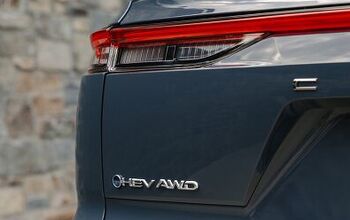Weekend Head Scratcher: Should Toyota Buy, Sell Or Hold Tesla?
Having ignored the first wave of EV enthusiasm, Toyota turned to Tesla in the aftermath of its recall scandal as an investment that could potentially catch it up with other EV makers, and possibly help its battered image along the way. Officially, the deal was brokered after Toyota CEO Akio Toyoda drove the Tesla Roadster, and came away impressed with its “splendid flavor.” Toyota then dropped $50m on Tesla’s stock and another $60m on the Tesla-developed RAV4 EV prototype, raising the possibility of re-starting production at the NUMMI plant, which Tesla bought from Toyota as part of the hookup. But with Toyota also developing an EV city car in-house and talking up the return of hydrogen cars, Tesla’s role in Toyota’s future is clear as mud. If the RAV4 EV makes financial sense, Tesla could contract-build them at NUMMI, adding much-needed volume to a giant factory that would otherwise be building only the Model S (at a rate of about 20k per year). But there’s the rub: Tesla clearly needs Toyota more than the other way around; it needs Toyota’s volume, manufacturing expertise and legitimacy. But what will Toyota get out of the relationship? An expensive EV compact crossover? Goodwill from the American people? The ability to keep in-house development looking past a short-term fad for EVs?
So here’s today’s puzzle: if you were Akio Toyoda, would you A) double down on Tesla, and buy a controlling share or even roll it into the parent company, B) quietly sell the stake and move on, or C) keep Tesla around as a speculative EV offshoot of the main company? It’s a complex question, and answers should touch on the market potential of EVs, Tesla’s strategy and viability, Toyota’s relationship with EVs, the PR benefits of keeping an American EV startup alive, and much, much more. Enjoy!
More by Edward Niedermeyer
Latest Car Reviews
Read moreLatest Product Reviews
Read moreRecent Comments
- Honda1 Unions were needed back in the early days, not needed know. There are plenty of rules and regulations and government agencies that keep companies in line. It's just a money grad and nothing more. Fain is a punk!
- 1995 SC If the necessary number of employees vote to unionize then yes, they should be unionized. That's how it works.
- Sobhuza Trooper That Dave Thomas fella sounds like the kind of twit who is oh-so-quick to tell us how easy and fun the bus is for any and all of your personal transportation needs. The time to get to and from the bus stop is never a concern. The time waiting for the bus is never a concern. The time waiting for a connection (if there is one) is never a concern. The weather is never a concern. Whatever you might be carrying or intend to purchase is never a concern. Nope, Boo Cars! Yeah Buses! Buses rule!Needless to say, these twits don't actual take the damn bus.
- MaintenanceCosts Nobody here seems to acknowledge that there are multiple use cases for cars.Some people spend all their time driving all over the country and need every mile and minute of time savings. ICE cars are better for them right now.Some people only drive locally and fly when they travel. For them, there's probably a range number that works, and they don't really need more. For the uses for which we use our EV, that would be around 150 miles. The other thing about a low range requirement is it can make 120V charging viable. If you don't drive more than an average of about 40 miles/day, you can probably get enough electrons through a wall outlet. We spent over two years charging our Bolt only through 120V, while our house was getting rebuilt, and never had an issue.Those are extremes. There are all sorts of use cases in between, which probably represent the majority of drivers. For some users, what's needed is more range. But I think for most users, what's needed is better charging. Retrofit apartment garages like Tim's with 240V outlets at every spot. Install more L3 chargers in supermarket parking lots and alongside gas stations. Make chargers that work like Tesla Superchargers as ubiquitous as gas stations, and EV charging will not be an issue for most users.
- MaintenanceCosts I don't have an opinion on whether any one plant unionizing is the right answer, but the employees sure need to have the right to organize. Unions or the credible threat of unionization are the only thing, history has proven, that can keep employers honest. Without it, we've seen over and over, the employers have complete power over the workers and feel free to exploit the workers however they see fit. (And don't tell me "oh, the workers can just leave" - in an oligopolistic industry, working conditions quickly converge, and there's not another employer right around the corner.)































Comments
Join the conversation
SELL! Toyota got Tesla to buy the white elephant NUMMI factory, a win, and any further involvement will likely be a net loss.
Buy! I can see the Toyota's, well actually Lexus's (Lexi?) at first with "powered by Telsa, suspension by Lotus" badges all over them. Everyone knows what a Prius is and a good amount of people know what a Telsa is. Pretty soon they'll know Leaf and Volt. If Toyota buys Telsa they become an EV powerhouse. Some may argue that they already unbeatable in the EV arena, but the competition is coming and the only way for Toyota to maintain their lead is make another jump ahead.